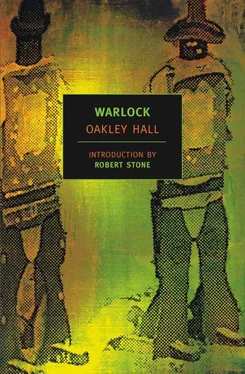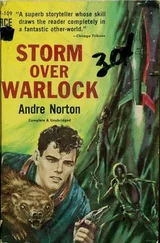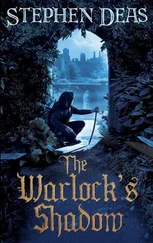“Why, yes, Marshal — I would like to.” He took up his own hat, and stood turning it in his hands. He had a feeling that Blaisedell knew exactly what he was going to say. “I’ve been wondering what Morgan is going to do, with the Glass Slipper burnt down.”
“I guess he is thinking of moving along,” Blaisedell said. “There is nothing to hold him here, with his place burned. He is one that likes a change.”
“Well, maybe it is better.”
Blaisedell’s eyes were cold as deep ice, and his voice was cold. “Maybe it is,” he said, and moved on outside.
Gannon took a deep breath and followed Blaisedell, who waited on the boardwalk. They started down toward the Lucky Dollar together, in silence. They had almost reached the corner when he realized that he was walking on Blaisedell’s right, when the gunman always walked to the right in order to keep his gun hand free; and then he knew that Blaisedell had chosen to have it that way.
50. JOURNALS OF HENRY HOLMES GOODPASTURE
May 14, 1881
MCQUOWN’s death, which would have been wildly celebrated here a few months ago, has set upon us a pall that is mitigated only in part by the pride we have felt in the emergence of a home-grown hero. The means of his death, for one thing — cowardly murder — and, for another, the meaninglessness of it. There should have been some meaning, some lesson, some sense of triumph. There was none.
Moreover, in the past weeks, it has been brought home to us that perhaps his champions were in part right, and that it was McQuown, who, although himself a rustler, kept order among the outlaws down valley, and confined their depredations to certain channels. He was not called the Red Fox for nothing. Control was necessary, organization brings control; therefore McQuown.
There has been a rash of petty rustling, and both the Redgold and Welltown stages were stopped by road agents within the last week alone. Blaikie has lost over a hundred head of stock, and one of his hands was wounded, not dangerously, by a crew of thieves he encountered. Burbage is incensed; McQuown was at least a man of honor, says he, indignantly. I, however, refuse to join in the general sainting of the outlaw. The border seems to be very tightly watched now, both by elements of the Mexican Army and Don Ignacio’s own vaqueros — it is said that he has declared war upon the rustlers who have harried him for so long, and will deal ruthlessly with any he can catch. Perhaps, in view of the border situation, McQuown died at the right time, or else, like those who have survived him, he might have had to turn to robbing his neighbors.
Gannon, resting on his laurels, has done nothing whatever since he dispatched Wash Haggin. Kennon does not like him, says he is a born coward and main-chancer, and only had the courage to fight Haggin because he knew Blaisedell would protect him. Buck Slavin defends him, but is losing patience. The judge, however, points out that Gannon is helpless to deal with a series of small and scattered raids in a hostile countryside, for he would have to be in constant motion with a posse increasingly difficult to assemble. The judge says that the situation will be alleviated only when backing is received from Sheriff Keller, and this will take place when outrage or notoriety have forced that worthy, or the General, to action. Perhaps Whiteside is seeing that wheels are being turned even now in our behalf; I doubt it to the bottom of my soul.
Pike Skinner, for his part, seems to have swung over to the deputy’s side, and defends him wholeheartedly. He points out that Gannon, in enemy territory, puts himself in grave danger of assassination, since to all appearances the Cowboys remain convinced that it was Gannon who murdered their chief; also that the stalwarts who would have enthusiastically formed the Vigilantes to protect Warlock from the Regulators, are not enthusiastic at all about riding down valley to face the Cowboys whose deadly mien and ready weapons were so much in evidence on their last appearance here.
Gannon is looked upon with distrust by a good many members of the Citizens’ Committee — or perhaps it is with jealousy. He remains, however, a hero to the unwashed elements. There is great interest on every hand in his future actions, and he is at the moment more a center of interest than is Blaisedell.
The present eye praises the present object.
Then marvel not, thou great and complete man,
That all the Greeks begin to worship Ajax,
Since things in motion sooner catch the eye
Than what not stirs.
But Hector is dead, and what is there left for Achilles to do?
May 16, 1881
It is thought here now that McQuown must have been murdered by Mexicans in the employ of Don Ignacio, in revenge, and as assurance against further rustling of Hacienda Puerto stock.
I am sure there would be some to accuse Blaisedell of the crime, had not Blaisedell been in evidence here that night. I have heard it said, though, that Morgan was clearly seen (by whom?) riding back into Warlock the following dawn upon a winded horse, as he was also seen (by whom?) riding back from the scene of the Bright’s City stage robbery, etc. No doubt Morgan is capable of such a murder, as no doubt he is capable of road-agentry, but I am unable to believe him capable of such strenuous diabolism merely for its own sake.
Yet more and more I see the conspiracy to bring Blaisedell low by gossip and canard, since it cannot be done by gunfire. They will strike at him through Morgan, against whose name is piled a higher and higher stack of guilt and sin, in the hope that this will topple over onto the Marshal. Very probably Morgan has no more moral code than a rhinoceros, and certainly he does nothing to make himself popular. He spends his time viewing and sneering at our activities from the veranda of the Western Star, and, afternoons and evenings, gambles at the Lucky Dollar, where he is having a phenomenal run of luck at the faro table, to Lew Taliaferro’s great discomfiture. Morgan was attacked there the other night by two miners, but, although he is not large in stature, he is a powerful and active man, and acquitted himself well. When he had had enough of the brawl he drew his six-shooter and put his attackers to flight, and then returned to his game, Will Hart said, as calmly as though nothing had happened.
The town itself is quiet and well behaved. Our population is growing. Among others, a man named Train and his wife, a faded but indomitable-looking woman, have arrived, with the prospect of building an eating establishment, which they claim will be of high quality. They are having great difficulty obtaining lumber, but Mrs. Train says firmly that she will not have adobe, which is dirty and repellent to white people. There has also been another marriage. Slator has taken to wife a Cyprian from the French Palace. The judge performed the ceremony, the validity of which might consequently be suspect, and Taliaferro, fittingly enough, gave the bride away. The happy couple has rented a cabin from one of the Medusa strikers, who was no doubt badly in need of money. Slator, formerly an irresponsible and drunken odd-jobman, has been given steady employment by Kennon at the livery stable, and shows every sign of having become a reformed character, this being attributed to his new responsibilities. I should think it might be difficult to possess a wife whom almost every other man in town has known so intimately, but no doubt True Love Conquers All.
So peace and civilization are encroaching upon Warlock. Yet it is not a pleasant peace. There is concern as to whether the strikers will accept their defeat, or will break out in some new violence. Miss Jessie has set up a breadline at the General Peach. They stand in the street at meal times, waiting their turn to be fed by her generosity, and are silent and sullen. MacDonald must fume at her feeding them, and yet I am sure that in the end he will win, and they will silently and sullenly go back to work at the Medusa.
Читать дальше







